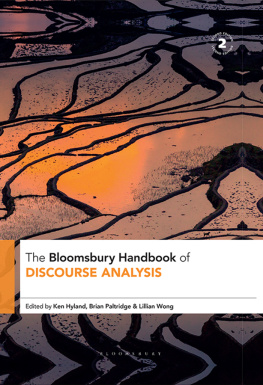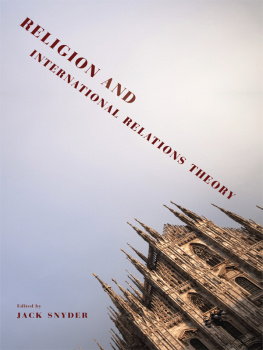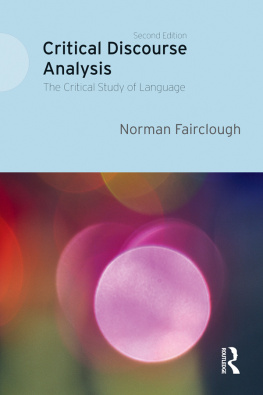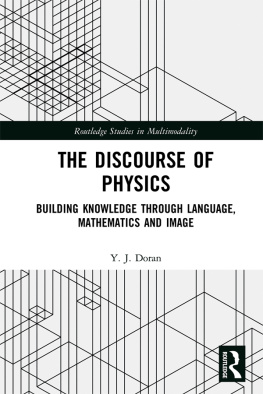Religion, Discourse, and Society
This book focuses on the utility and application of discourse theory and discourse analysis in the sociological study of religious change. It presents an outline of what a discursive sociology of religion looks like and brings scholarly attention to the role of language and discourse as a significant component in contemporary processes of religious change. Marcus Moberg addresses the concept of discourse and its main meta-theoretical underpinnings and discusses the relationship between discourse and religion in light of previous research. The chapters explore key notions such as secularism and public religion as well as the ideational and discursive impact of individualism and market society on the contemporary Western religious field. In addition to providing scholars with a thorough understanding and appreciation of the analytic utility of discourse theory and analysis in the sociological study of religious change, the book offers a cohesive and systematized framework for actual empirical analysis.
Marcus Moberg is a Professor in the Study of Religions at bo Akademi University, Finland.
Routledge Studies in Religion
- Jewish Approaches to Hinduism
- A History of Ideas from Judah Ha-Levi to Jacob Sapir (12th19th centuries)
- Richard G. Marks
- Spiritual, Religious, and Faith-Based Practices in Chronicity
- An Exploration of Mental Wellness in Global Context
- Edited by Andrew R. Hatala and Kerstin Roger
- An Anthropology of the Quran
- Ahmed Achrati
- Contrasts in Religion, Community, and Structure at Three Homeless Shelters
- Changing Lives
- Ines W. Jindra, Michael Jindra and Sarah DeGenero
- Enhancement Fit for Humanity
- Perspectives on Emerging Technologies
- Michael Baggot
- Catholic Peacebuilding and Mining
- Integral Peace, Development, and Ecology
- Edited by Caesar A. Montevecchio and Gerard F. Powers
- Religion, Discourse, and Society
- Towards a Discursive Sociology of Religion
- Marcus Moberg
For more information about this series, please visit: https://www.routledge.com/religion/series/SE0669
First published 2022
by Routledge
2 Park Square, Milton Park, Abingdon, Oxon OX14 4RN
and by Routledge
605 Third Avenue, New York, NY 10158
Routledge is an imprint of the Taylor & Francis Group, an informa business
2022 Marcus Moberg
The right of Marcus Moberg to be identified as author of this work has been asserted in accordance with sections 77 and 78 of the Copyright, Designs and Patents Act 1988.
All rights reserved. No part of this book may be reprinted or reproduced or utilised in any form or by any electronic, mechanical, or other means, now known or hereafter invented, including photocopying and recording, or in any information storage or retrieval system, without permission in writing from the publishers.
Trademark notice: Product or corporate names may be trademarks or registered trademarks, and are used only for identification and explanation without intent to infringe.
British Library Cataloguing-in-Publication Data
A catalogue record for this book is available from the British Library
Library of Congress Cataloging-in-Publication Data
A catalog record has been requested for this book
ISBN: 9780367435752 (hbk)
ISBN: 9781032193632 (pbk)
ISBN: 9780367435837 (ebk)
DOI: 10.4324/9780367435837
Typeset in Sabon
by codeMantra
1 Introduction
DOI: 10.4324/9780367435837-1
The sociological study of religion remains centrally concerned with ongoing processes of religious change across the liberal democratic societies of the West, and increasingly beyond. A wide range of different types of modern changes, transformations, and mutations in the religious field have been studied under this general and somewhat ambiguous rubric. These include (but are not limited to) progressive long-term institutional religious decline; the proliferation of individualized religious outlooks and alternative spiritualties; significant increases in the numbers of people who self-identify as non-religious; the growing public presence and visibility of religion; the increasing commodification and/or marketization of religion; and changes in the environments, spaces, and locations of religion following continuous developments in new media and digital communication and information technologies. While several additional developments could be added to the list, taken together, these processes clearly point to the ways in which the Western religious field has been and been perceived to have been in a continuing state of flux over the past five to six decades, if not for longer.
The sociological study of religion has for some time already found itself in a transitional phase, marked by the rethinking and increasing abandonment of
Religious change is, of course, not adequately understood as something that occurs in isolation from changes at broader societal and cultural levels. Rather, religious change constitutes a particular type of social change that, like all processes of social change, includes significant ideational and discursive components. As Norman Fairclough points out, from the perspective of discourse theory, Discourse is part of social change, and no satisfactory account of it can ignore relations between discourse and other elements of social reality.Fairclough point out,
It is an important characteristic of the economic, social and cultural changes of late modernity that they exist as discourses as well as processes that are taking place outside discourse, and that the processes that are taking place outside discourse are substantively shaped by these discourses.
Discourse and discursive practice therefore need to be viewed as part of society, and not somehow external to it and as conditioned by other (non-linguistic) parts of society.
When viewed in this light, all of the abovementioned processes of religious change have been As broader changes in language use and discursive practice leave their imprint on the ways in which religion is expressed, practiced, and understood, religious change needs, in no small part, to be understood as consisting of changes in discursive practices on and about religion.
Towards a discursive sociology of religion
This book outlines the contours of a discursive sociology of religion. This, first, is a sociology of religion that brings discourse theoretical and analytical perspectives into direct conversation with sociological perspectives in a transdisciplinary spirit. In particular, it views discourse analysis as providing a set of particular tools for broader theory-driven process[es] of constructing objects of research for research topics which cannot be adequately analyzed through a focus on discourse alone.belief, spirituality, and the secular as fundamentally discursive categories that always gain their meanings in the particular communicative, relational, and interpretive contexts in which they appear and are used.
Second, a discursive sociology of religion is also one that constantly strives to maintain a high degree of critical awareness of the multitude of ways in which scholarly theorizing itself contributes to the construction of particular realities about religion, the religious, and related social categories and phenomena. In the chapters that follow, several influential and much-debated theoretical perspectives in the sociology of religion will be subjected to critical examination from a discursive point of view. This is in order to highlight the notable extent to which our theoretical perspectives and their associated terminological repertoires supply us with particular ways of perceiving and understanding the realities on the ground, what we understand religion to be, how religion interacts with and entwines with other social and cultural forces and phenomena, how we set out to gather data on our chosen topics of research, what we count and/or perceive as data in the first place, how we eventually analyze and explain our findings, and so on. A discursive sociology of religion, in short, therefore invites us to view both the category of religion






